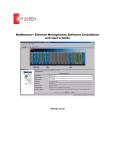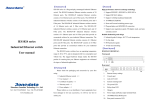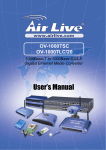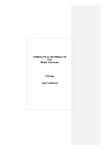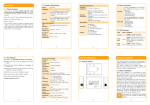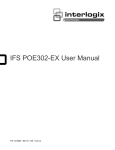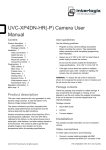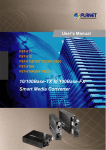Download IFS MC201-1P/1FS User Manual
Transcript
IFS MC201-1P/1FS User Manual P/N 1076525 • REV A • ISS 07FEB12 Copyright Trademarks and patents Manufacturer Version Certification FCC compliance ACMA compliance European Union directives © 2012 UTC Fire & Security Company. All rights reserved. Interlogix, IFS MC201-1P/1FS, the IFS Brand and logo are trademarks of UTC Fire & Security. Other trade names used in this document may be trademarks or registered trademarks of the manufacturers or vendors of the respective products. UTC Fire & Security Americas Corporation, Inc. 2955 Red Hill Avenue, Costa Mesa, CA 92626-5923, USA This document applies to IFS MC201-1P/1FS version 1.0. N4131 Class A: This equipment has been tested and found to comply with the limits for a Class A digital device, pursuant to part 15 of the FCC Rules. These limits are designed to provide reasonable protection against harmful interference when the equipment is operated in a commercial environment. This equipment generates, uses, and can radiate radio frequency energy and, if not installed and used in accordance with the instruction manual, may cause harmful interference to radio communications. Operation of this equipment in a residential area is likely to cause harmful interference in which case the user will be required to correct the interference at his own expense. Notice! This is a Class A product. In a domestic environment this product may cause radio interference in which case the user may be required to take adequate measures. 2004/108/EC (EMC directive): Hereby, UTC Fire & Security declares that this device is in compliance with the essential requirements and other relevant provisions of Directive 2004/108/EC 2002/96/EC (WEEE directive): Products marked with this symbol cannot be disposed of as unsorted municipal waste in the European Union. For proper recycling, return this product to your local supplier upon the purchase of equivalent new equipment, or dispose of it at designated collection points. For more information see: www.recyclethis.info. Contact information Customer support www.utcfireandsecurity.com or www.interlogix.com www.interlogix.com/customer-support Contents Overview 1 About the MC201-1P/1FS 1 Package Contents 2 Hardware Overview 3 Front Panel 4 Back Panel 4 Link Fault Pass-through (LFP) 4 Link Loss Carry Forward (LLCF) 5 Link Loss Return (LLR) 6 Installing the Converter 7 PoE Function 8 LED Indicators 9 System 9 10/100Base-TX Port 9 100Base-FX SC Port 9 Specifications 11 Cable Specifications 12 RJ-45 Pin Assignments 12 RJ-45 Cable Pin Assignments 12 Fiber Optic Cable Connection Specifications 13 Contacting Technical Support 14 IFS MC201-1P/1FS User Manual i Overview Thank you for purchasing the IFS MC201-1P/1FS 10/100Mbps Ethernet Twisted pair to 100Base-FX fiber optic PoE Bridge Converter. This converter is used to convert one type of media signal to a different type of media that allows two segments to connect easily, efficiently and inexpensively. The converter supports Power over Ethernet to power one IEEE 802.3af compliant powered device. About the MC201-1P/1FS The MC201-1P/1FS is an IEEE 802.3af Power over Ethernet Converter that supplies 48 VDC over Ethernet cable. The MC201-1P/1FS IEEE 802.3af Power over Ethernet Converter inserts DC Voltage onto a Category 5 cable, allowing the cable between the Converter (MC201-1P/1FS) and PoE PD (Powered Device) to transfer data and power simultaneously. The maximum distance between the Converter (MC2011P/1FS) and PoE PD is 328 ft. (100m). MC201-1P/1FS combines Ethernet with IEEE 802.3af power and transfers over the twisted pair cables. A PoE splitter can be used to separate the Ethernet data and power if needed to power a non-PoE device. With the MC201-1P/1FS, only one Ethernet cable is needed to carry both power and data to each device providing simpler network designs, higher reliability while reducing costs. Note: PSE (Power Sourcing Equipment) is a device (switch, or hub for instance) that will provide power in a PoE setup. The maximum allowed continuous output power per such device is 15.4W according to the IEEE 802.3af standard. IFS MC201-1P/1FS User Manual 1 PD (Powered Device) is a device powered by the PSE and thus consumes energy, such as IP Phones, network cameras and Wireless access points, etc. Package Contents Open the package containing the MCR205-1T/1S and carefully unpack it. The box should contain the following items: • MCR205-1T/1S PoE Media Converter x1 • User’s Manual CD x1 If any of these items are missing or damaged, please contact your dealer immediately. If possible, retain the product box including the original packing material to return it for repair/replacement. 2 IFS MC201-1P/1FS User Manual Hardware Overview Figure 1: Physical Layout IFS MC201-1P/1FS User Manual 3 Front Panel There is one RJ-45 Twisted-Pair jack (Auto-MDI/MDI-X), one fiber-optic connector and four LED indicators on the MC2011P/1S front panel. Back Panel There is one DIP switch for turning the Link Fault Passthrough feature on or off, and 48V DC power input located at the back panel. The back panel also has one 48 VDC power socket for the MC201-1P/1S. Note: Please make sure that the 48VDC power supply used is capable to provide 0.32A to support full PoE load. Link Fault Pass-through (LFP) The LFP function refers to the Link Fault Pass-through function (LLCF/LLR) and the DIP Switch design. LLCF/LLR can immediately notify administrators about a connectivity problem. The DIP Switch enables or disables the LFP function. 4 IFS MC201-1P/1FS User Manual LLCF (Link Loss Carry Forward) detects the connection loss on the TP line, and LLR (Link Loss Return) detects the connection loss on the fiber line. Link Loss Carry Forward (LLCF) The MC201-1P/1FS incorporates an LLCF function for troubleshooting a remote connection. When LFP function is enabled, the FL/TP ports do not transmit a link signal until they receive a link signal from the opposite port. The diagram below shows a typical network configuration with a good link status using MC201-1P/1FS for remote connectivity. In case of a connectivity issue, the MC201-1T/1FS media converter LLCF sends the notification to the switch/hub that generates a trap to the management station. * The default is set to OFF for LFP function. IFS MC201-1P/1FS User Manual 5 Link Loss Return (LLR) The fiber ports of the MC201-1P/1FS have been designed with an LLR function for troubleshooting a connectivity issue. LLR works in conjunction with LLCF. When LFP function is enabled, the port’s transmitter shuts down when its receiver fails to detect a valid connection. LLR should only be enabled on one end of the link and is typically enabled on either the unmanaged or remote device. The diagram below shows a typical network configuration with a good link status using MC201-1P/1FS for remote connectivity. Note that LLR and LLCF are enabled as indicated in the diagram. If one of the optical conductors is bad (as shown in the diagram box below), the fiber converter with LLR function will return a no-link condition to its link partner. With LLCF function also enabled, the no-link condition is carried forward to the switch/hub where a trap is generated to the management station. 6 IFS MC201-1P/1FS User Manual Note: LFP function is turned-off by default. This feature can also be enabled or disabled via the side DIP-switch. If the installer is familiar with the network installation and diagnostics (i.e. checking which end is broken in a connection), switch can be set to ON position and converter should be reset for changes to take effect. Otherwise, it's recommended to keep the DIP switch in its default position. Installing the Converter Please follow these steps to install the MC201-1P/1FS: 1. Turn off the power of the network device/station in the network to which the MC201-1P/1FS will be attached. 2. Ensure that there is no activity on the network. 3. Attach the fiber cable from the MC201-1P/1FS to the fiber network. TX/RX must be paired at both ends. 4. Attach a Category 5 UTP cable from the 10/100Base-TX network to the RJ-45 port on the MC201-1P/1FS. 5. Connect the 48V DC power adapter to the MC201-1P/1FS and verify that the Power LED illuminates. 6. Turn on the network device/station, the TX Link and FX Link LEDs should illuminate when all the cables are attached. IFS MC201-1P/1FS User Manual 7 TX RX RX TX 100Base-FX Fiber Network 10/100Base-TX Cat. 5/5e TP Cable Network Note: RJ-45/STP, UTP Cat 5, straight /crossover cable is accepted. Please refer to the Cable Specification section for more details about the wiring distance of your TP, optical fiber networks. PoE Function The MC201-1P/1FS IEEE 802.3af Powered Device/Splitter equipment installation: It's recommended to check your network environment before the installation. The MC201-1P/1FS media converter sends the power over the twisted pair cable (pair 1, 2 and pair 3, 6). For locations where it may be difficult to find a power outlet, the MC201-1P/1FS provides the easiest way to power your PoE powered Ethernet devices such as IP cameras, IP access control, VoIP, Wireless Access Points (WAP), etc. 2km~15km 100 meters Data Data+Power PoE Wireless AP Fiber Switch Power 8 IFS MC201-1P/1FS User Manual Note: The PoE feature requires the use of a recommended power adapter. LED Indicators System LED Color PWR Green Function Lit Indicates the device is powered. 10/100Base-TX Port LED Color Function Blink Indicates that the Media Converter is actively sending or receiving data over that port. LNK/ACT PoE in Use Lit Indicates that the connection through the port is successfully established. Off Indicates that the connection through the port is not established. Lit Indicates that the port is providing PoE to the connected device. Off Indicates that the port is not providing PoE to the connected device. Green Green 100Base-FX SC Port LED Color Function Blink LNK/ACT Green Indicates that the Media Converter is actively sending or receiving data over the port. Lit Indicates that the port link is up. Off Indicates that the port link is down. Note: Fiber optic port should be set to the correct mode according to this LNK/ACT indicator for optimal network performance. IFS MC201-1P/1FS User Manual 9 10 IFS MC201-1P/1FS User Manual Specifications Ethernet Data Rate Throughput (packet per second) Switch Architecture 10/100/1000Mbps 148810pps@64Bytes Store-and-Forward Back pressure for Half-Duplex mode Flow Control Pause from for Full-Duplex mode (IEEE 802.3x) Connector RJ-45 with Auto-MDI/MDI-X and PoE injector function Cable Type and Distance 10Base-T (Cat 3, 4, 5e) or 100Base-T (Cat 5e) – 328ft (100m) Fiber MC100FX-TX-PoE MC201-1P/1FS Data Rate 100Base-FX 100 Base-FX Connector SC SC Fiber Type Multi-mode (50/125μm or 62.5/125μm Single mode (9/125μm) Distance Up to 2km Up to 15km Power Over Ethernet (PoE) PoE Standard IEEE 802.3af Power Pin Assignment (+) Pins 1 & 2; (–) Pins 3 & 6 Power Output (Max. 1 PoE Device) PoE 48 VDC, Max. 15.4 watts, 350mA LED Indicators Power Status On - Green 10/100Base-T Link Data Activity - Green 100Base-FX Link Data Activity - Green PoE In Use Detection of PSE Device - Green LFP Mode Switch On If either TX or FX port is faulty, disable other port Off Active link LED will still operate if other port is faulty Electrical and Mechanical Input Power 48VDC @ 0.38A Enclosure Metal Dimensions (H x W x D) 1.02 x 2.76 x 3.82 in. (26 x 70 x 97 mm) Weight 0.44 lbs. / 200g Environmental Operating Temperature 0ºC~50ºC Storage Temperature -120ºC~70ºC Relative Humidity 0%–90% (non-condensing) IFS MC201-1P/1FS User Manual 11 Cable Specifications Duplex Connection Limitation (max.) Twisted Pair Half / Full Node to Node Node to Switch/Hub 100 meters Single-Mode Converters SM Full Node to Node Node to Switch 15 kilometers RJ-45 Pin Assignments 10/100Mbps, 10/100Base-TX Contact MDI MDI-X 1 1 (TX +) 3 2 2 (TX -) 6 3 3 (RX +) 1 6 6 (RX -) 2 4, 5, 7, 8 Not used Not used Implicit implementation of the crossover function within a twisted-pair cable, or at a wiring panel, while not expressly forbidden, is beyond the scope of this standard. RJ-45 Cable Pin Assignments 12 IFS MC201-1P/1FS User Manual There are 8 wires on a standard UTP/STP cable and each wire is color-coded. The following shows the pin allocation and color of straight cable and crossover cable connections: Fiber Optic Cable Connection Specifications The optical details are shown below: Fiber Optical patch Cables: Standard Fiber Type Cable Specification 100Base-FX (1310nm) Multi-mode 50/125μm or 62.5/125μm 100Base-FX (1310nm) Single-mode 9/125μm IFS MC201-1P/1FS User Manual 13 Contacting Technical Support Contact technical support if you encounter any difficulties during this installation. Please make sure you have the requested diagnostic or log files ready before you contact us by phone or go to www.interlogix.com/customer-support. Technical Support Europe, Middle East and Africa W Select Contact Us at www.utcfssecurityproducts.eu North America T +1 855.286.8889 E [email protected] Australia E 14 [email protected] IFS MC201-1P/1FS User Manual
























